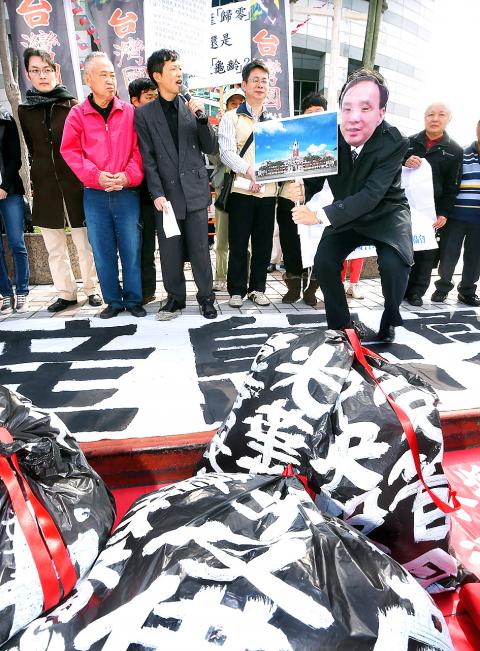Despite the assertion by Vice President Wu Den-yih (吳敦義), when he was acting chairman of the Chinese Nationalist Party (KMT), that all of the party’s assets were acquired through legitimate means, KMT Chairman Eric Chu (朱立倫) yesterday asked for an investigation of the issue, which is to be conducted by “impartial” public figures.
At the first meeting of the KMT’s Central Standing Committee since his inauguration as chairman on Monday, Chu, who is also mayor of New Taipei City, said he has commissioned Jennifer Wang (王如玄), a lawyer and a former Council of Labor Affairs minister, and KMT Legislator Liao Cheng-ching (廖正井) to form a team of party members known for their impartiality and professionalism to look into the assets issue.
The team is to go through documents related to the party’s assets and its financial status and produce a report, an idea that had been suggested to Chu throughout his campaign for chairman, he said.

Photo: Fang Pin-chao, Taipei Times
Chu has promised that any of the KMT’s assets — which critics call “ill-gotten” because they were allegedly taken by the party from the Japanese colonial government, private businesses and individuals when the KMT took control of Taiwan after World War II — found to be illegally acquired by the party will be returned to the nation.
Chu’s pledge came despite Wu telling a committee meeting at the end of last month that there were no assets obtained through improper means following a briefing by then-KMT Administration Committee head Lin Te-jui (林德瑞).
Aside from the party’s assets, Chu asked KMT Vice Chairman Hau Lung-bin (郝龍斌) to revamp the National Policy Foundation, the party’s think tank, to “function as it is supposed to” and KMT Vice Chairperson Huang Min-hui (黃敏惠) to lead a team to discuss how to reshape the party.
Chu said he is aiming to turn the KMT into a highly effective self-made party dedicated to volunteerism.
At the meeting, committee member Lin Rong-te (林榮德), with more than 20 cosigners, proposed that the party withdraw its appeal of the ruling in favor of Legislative Speaker Wang Jin-pyng (王金平) retaining his party membership.
The KMT, then led by President Ma Ying-jeou (馬英九), revoked Wang’s membership amid allegations that he had used his influence to try and affect the outcome of a legal case in 2013.
The Special Investigation Division of the Supreme Prosecutors’ Office accused Wang of meddling in a breach of trust lawsuit on behalf of Democratic Progressive Party caucus whip Ker Chien-ming (柯建銘) by urging two high-ranking judicial officials to influence a prosecutor into refraining from appealing Ker’s not-guilty verdict.
Chu decided to postpone a decision on Lin’s proposal until new chairperson of the Central Evaluation and Discipline Committee, KMT Legislator Huang Chao-shun (黃昭順), presents a plan to the committee next week to reform the evaluation and discipline system.
Throughout Chu’s campaign, he hinted at the possibility that the party would rescind its decision to revoke Wang’s membership in an effort to boost morale.

CHAOS: Iranians took to the streets playing celebratory music after reports of Khamenei’s death on Saturday, while mourners also gathered in Tehran yesterday Iranian Supreme Leader Ayatollah Ali Khamenei was killed in a major attack on Iran launched by Israel and the US, throwing the future of the Islamic republic into doubt and raising the risk of regional instability. Iranian state television and the state-run IRNA news agency announced the 86-year-old’s death early yesterday. US President Donald Trump said it gave Iranians their “greatest chance” to “take back” their country. The announcements came after a joint US and Israeli aerial bombardment that targeted Iranian military and governmental sites. Trump said the “heavy and pinpoint bombing” would continue through the week or as long

TRUST: The KMT said it respected the US’ timing and considerations, and hoped it would continue to honor its commitments to helping Taiwan bolster its defenses and deterrence US President Donald Trump is delaying a multibillion-dollar arms sale to Taiwan to ensure his visit to Beijing is successful, a New York Times report said. The weapons sales package has stalled in the US Department of State, the report said, citing US officials it did not identify. The White House has told agencies not to push forward ahead of Trump’s meeting with Chinese President Xi Jinping (習近平), it said. The two last month held a phone call to discuss trade and geopolitical flashpoints ahead of the summit. Xi raised the Taiwan issue and urged the US to handle arms sales to

State-run CPC Corp, Taiwan (CPC, 台灣中油) yesterday said that it had confirmed on Saturday night with its liquefied natural gas (LNG) and crude oil suppliers that shipments are proceeding as scheduled and that domestic supplies remain unaffected. The CPC yesterday announced the gasoline and diesel prices will rise by NT$0.2 and NT$0.4 per liter, respectively, starting Monday, citing Middle East tensions and blizzards in the eastern United States. CPC also iterated it has been reducing the proportion of crude oil imports from the Middle East and diversifying its supply sources in the past few years in response to geopolitical risks, expanding

OTHER OPTIONS: Given possible US intervention and Taiwanese counterattacks, China might opt to blockade Taiwan or take its outlying islands instead of an all-out invasion A US think tank has urged Taiwan to adopt a “hellscape” strategy that would flood the Taiwan Strait with drones and other uncrewed systems to deter invasion by China. In its report, Hellscape for Taiwan, published on Thursday, the Center for a New American Security said Taipei’s asymmetric defense approach — often described as a “porcupine strategy” — needs to evolve to keep pace with the growing capabilities of the Chinese People’s Liberation Army. The “hellscape” strategy involves saturating the air and waters around Taiwan with thousands of drones and other platforms capable of striking invading forces from multiple domains at once. Long-range